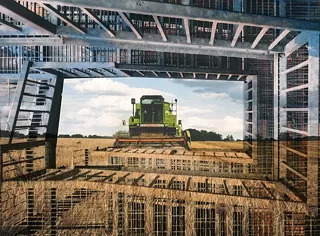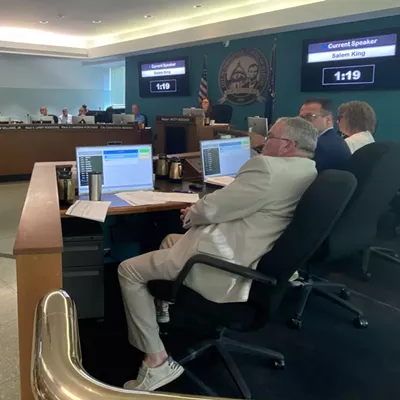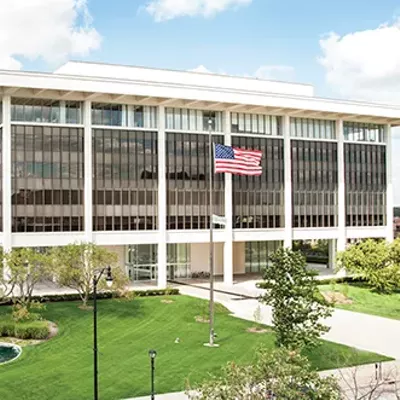BY SCOTT FAINGOLD
On July 27, the Citizens Club of Springfield presented its most recent Public Policy Breakfast, “A Local Conversation on Tariffs” at the Hoogland Center for the Arts. The discussion featured panelists Dr. Patricia Byrnes, a professor in the economics department at the University of Illinois Springfield; Mark Gebhards, executive director of government affairs and commodities for the Illinois Farm Bureau; and Mark Selvaggio, president of Selvaggio Steel.
The discussion was moderated by Bruce Sommer of the UIS Center for Entrepreneurship. The session focused on the Trump administration’s ongoing trade war with China, along with recently imposed tariffs on imports of steel and aluminum from Mexico, Canada and the EU. The panel also discussed the administration’s July announcement of $12 billion in subsidies intended to help farmers cope with loss of revenue due to the tariffs.
“Our current president has decided we should put tariffs on steel and aluminum, as well as other products, in order to combat what he considers unfair trade,” explained Byrnes. “But at what cost? Consumers will see higher prices on protected goods and higher prices from industries that use protected goods in production, such as automobiles and electronics.”
She went on to point out that 18 percent of aluminum is used in packaging of products such as beer, candy and pharmaceuticals, all of which are likely to see price increases. Byrnes also explained that China has placed restrictions on exports of soybeans, corn and other products, with Illinois being among the top five states to be impacted. “In 11 counties surrounding Sangamon, we can expect about 2,072 jobs to be potentially impacted by just the first and second rounds of Chinese export tariffs,” Byrnes said.
Byrnes pointed out that the U.S. imports $505 billion in Chinese goods, while China imports only $103 billion in U.S. commodities. “There’s not a lot of wiggle room for China to retaliate, so we could end up bigger winners in tit-for-tat retaliations,” she said. However, she warned that Beijing can find other ways to hurt U.S. businesses, ranging from slowing down customs on imports from the U.S. to stepping up regulatory checks on U.S. operations in China or even introducing negative campaigns to convince Chinese citizens not to buy U.S. products.
“We have taken an initial hit, because our material prices have gone up without us being able to protect ourselves or our clients in a proper way,” said Selvaggio, describing the dangers of material prices going up after having provided a quote to a client. He cited the example of a recent $46,000 job which resulted in a loss of $6,000 due to tariffs, just from material escalation. “Six thousand dollars isn’t a staggering amount of money, but you have to protect your clients, who are protecting their clients,” he said, adding that over the past few months Selvaggio Steel has made contracts with steel mills and warehouses to set aside material already on hand, agreeing ahead of time on a firm price.
Selvaggio pointed out that tariffs are far from the only factor impacting prices of raw materials, with steel already having gone up approximately 37 percent between Sept. 2017 and June 2018 – well before the tariffs – along with the dollar taking a seven to eight percent hit in the past year. Still, the current climate of trade war worries him. “If Trump is playing four-dimensional chess, I’d like to get to the point where the game is over and we see the fruition of what he’s trying to accomplish,” he said
“From an agricultural standpoint, this is one of the biggest issues we’ve dealt with in quite some time,” said Gebhards, explaining that Illinois exports about 44 percent of the grain it grows, making it the third largest exporting state in the country in terms of overall agricultural products.
“Illinois exports about 25 percent of its product to China – so one in every four rows of soybeans you see around here goes to that Chinese market. That’s a big issue.” Gebhards went on to say that the U.S.-China trade industry provides 2.6 million jobs in this country, and that job loss as a result of the trade war is a real concern, one which is only just beginning. He quoted Dr. Chris Hurt, an agricultural economist with Purdue University, estimating that agriculture in the U.S. has lost $20 billion in value since the tariffs went into effect.
Gebhard also said that the recent announcement by President Trump and Secretary of Agriculture Sonny Purdue of $12 billion to assist American farmers raises a tremendous amount of questions. “If you subsidize one industry, how does that affect other industries?” he asked. “I’ve been on three conference calls, with Washington, the White House and the USDA, this week alone, and I can tell you there is not a clear plan as to how we’re going to disseminate this money. What is that going to be based on?”
Gebhard said that he receives calls every day from farmers asking for details, which the Farm Bureau simply doesn’t have. “We have been saying since day one that these tariffs are not a good idea, (it’s) a terrible way to do business,” he said. “We were criticized for that by some of our members who said we need to let the president address the issue. Those same members are now calling me, asking what we’re going to do about this problem.” Gebhard explained the bureau’s preferred approach would be to negotiate with China, re-negotiate NAFTA and create a bilateral agreement with Japan.
“The only certainty we have in agriculture is uncertainty,” he said.
Scott Faingold can be reached at sfaingold@illinoistimes.com














